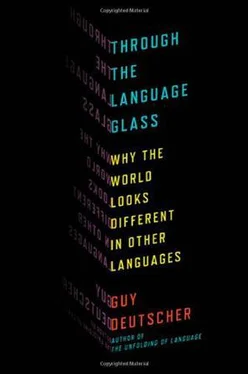Red as an arousing color: Wilson 1966, Jacobs and Hustmyer 1974, Valdez and Mehrabian 1994.
“crude conceptions of colour derived from the elements”: Gladstone 1858, 3:491.
“Colours were for Homer not facts but images”: Gladstone 1877, 386.
The Hanunoo: Conklin 1955, who does not refer to Gladstone. On the similarity between ancient Greek and Hanunoo, see also Lyons 1999.
page 93 From brightness to hue as a modern theory: MacLaury 1997; see also Casson 1997.
the acquired aptitudes of one generation: Gladstone 1858, 3:426.
“progressive education”: Gladstone 1858, 3:495.
Naturalness in concept learning: See Waxman and Senghas 1992.
Yanomamö kinship terms: Lizot 1971.
The innateness controversy: The most eloquent exposition of the nativist view is Steven Pinker’s The Language Instinct (1994). Geoffrey Sampson’s The “Language Instinct” Debate (2005) offers a methodical refutation of the arguments in favor of innate grammar, as well as references to the voluminous academic literature on the subject.
5: PLATO AND THE MACEDONIAN SWINEHERD
The flaws of the equal-complexity dogma: For a fuller argument, see Deutscher 2009.
“You really mean the Aborigines have a language?”: Dixon 1989, 63.
“Plato walks with the Macedonian swineherd”: Sapir 1921, 219.
“Investigations of linguists date back”: Fromkin et al. 2003, 15. (Full quotation: “There are no primitive languages. All languages are equally complex and equally capable of expressing any idea in the universe.” The equal-complexity slogan is repeated also on p. 27.
“It is a finding of modern linguistics”: Dixon 1997, 118.
“A central finding of linguistics has been”: Forston 2004, 4.
“Objective measurement is difficult”: Hockett 1958, 180. For a discussion of this passage, see Sampson 2009.
Compensation in complexity between different subareas: Whenever linguists have tried, heuristically, to detect any signs of compensation in complexity between different areas they have failed to find them. See Nichols 2009, 119.
Vocabulary size: Goulden et al. 1990 have estimated the vocabulary size of an average native-English-speaking university student at about seventeen thousand word families (a word family being a base word together with its derived forms, e.g., happy, unhappy, happiness), or as many as forty thousand different word types. Crystal 1995, 123, estimates the passive vocabulary of a university lecturer at seventy-three thousand words.
Sorbian dual: Corbett 2000, 20.
Five categories of cultural complexity: Perkins 1992, 75.
Recent studies on the relation between morphological complexity and size of society: See, e.g., Sinnemäki 2009; Nichols 2009, 120; Lupyan and Dale 2010.
Gothic verb habaidedeima : Schleicher 1860, 34.
Communication among intimates: Givón 2002.
Size of sound inventories: Maddieson 1984, 2005.
Correlation between the number of speakers and the size of the sound inventory: Hay and Bauer 2007. For earlier discussions, see Haudricourt 1961; Maddieson 1984; and Trudgill 1992.
Pirahã: See most recently Nevins et al. 2009 and Everett 2009.


Ubarum told Iribum to dispossess Kuli: Foster 1990, who reads u li-pi 5 -i -ZU- ma and translates “that he might work it,” but see Hilgert 2002, 484, and a near-identical form in Whiting 1987 no. 12:17, which proves the correctness of the translation given here.
Absence of complement clauses in many Australian languages: See Dixon 2006, 263, and Dench 1991, 196-201. For Matses, see Fleck 2006. See also Deutscher 2000, ch. 10.
Finite complements are a more effective tool: Deutscher 2000, ch. 11.
A flurry of publications from the last couple of years: See most recently the collection of articles in Sampson et al. 2009.
“The normal man of intelligence”: Sapir 1924, 149.
“what fetters the mind and benumbs the spirit”: Sapir 1924, 155.
“We shall no longer be able to see”: Whorf 1956, 212.
Data collection in the eighteenth century: In 1710, Leibnitz called for the creation of a “universal dictionary.” In 1713, he wrote to the Russian czar Peter the Great, imploring him to gather word lists from the numerous undocumented languages spoken in his empire. The idea was taken up at the Russian court in all earnestness two generations later, when Catherine the Great started working on exactly such a project, personally collecting words from as many languages as she could find. She later commissioned others to continue her work, and the result was the so-called imperial dictionary ( Linguarum Totius Orbis Vocabularia Comparativa ) of 1787, which contained words from over two hundred languages of Europe and Asia. A second edition, published in 1790-91, added seventy-nine more languages. In 1800, the Spanish ex-Jesuit Lorenzo Hervás published his Catálogo de las lenguas de las naciones conocidas , which contained more than three hundred languages. And in the early nineteenth century, the German lexicographer Christoph Adelung started compiling his Mithridates (1806-17), which was to collect vocabularies and the text of the “Our Father” from 450 different languages. On these compilations, see Müller 1861, 132ff.; Morpurgo Davies 1998, 37ff.; and Breva-Claramonte 2001.
The dictionaries revealed little of value about the grammar of exotic languages: There is one notable exception, Lorenzo Hervás’s Catálogo de las lenguas de las naciones conocidas , which contained grammatical sketches. Humboldt befriended Hervás in Rome and received from him materials on American Indian languages. Nevertheless, Humboldt did not have a high opinion of Hervás’s competence in grammatical analysis. In a letter to F. A. Wolf (March 19, 1803), he writes: “The old Hervás is a confused and unthorough person, but he knows a great deal, has an enormous amount of notes, and is therefore always useful.” As Morpurgo Davies (1998, 13-20, 37) points out, there is a natural tendency when assessing one’s own achievement to underplay the achievements of one’s predecessors. This may well be the case with Humboldt’s assessment of Hervás. Even so, it is undeniable that Humboldt took comparative grammar to an entirely different level of sophistication.
Missionary grammars: Jooken 2000.
“It is sad to see what violence”: Humboldt 1821a, 237. See also Humboldt 1827, 172.
“The difference between languages”: Humboldt 1820, 27. Humboldt did not invent this sentiment out of the blue, but previous claims to this effect were restricted mostly to observations about differences between the vocabularies of mainstream European languages. The French philosopher Étienne de Condillac, for example, commented on the difference between French and Latin in the connotations of words to do with agriculture. If grammatical differences were brought into the discussion at all, they never went beyond such banalities as Herder’s claim that “industrious nations have an abundance of moods in their verbs” (1812, 355).
“is not just the means for representing a truth”: Humboldt 1820, 27. On precursors to the idea, most notably Johann David Michaelis’s 1760 Prussian Academy prize essay, see Koerner 2000. Humboldt himself had already expressed the sentiment in vague form in 1798, before he had been exposed to non-Indo-European languages (Koerner 2000, 9).
“language is the forming organ of thought”: Humboldt 1827, 191.
“Thinking is dependent not just on language in general”: Humboldt 1820, 21.
Читать дальше













